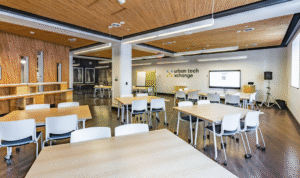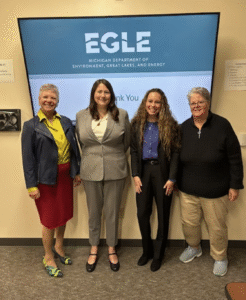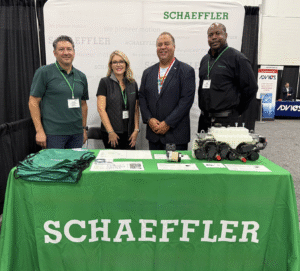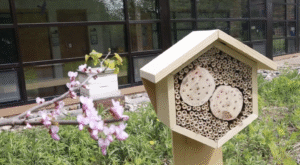
- Kim Kisner
- Community
- 10/17/2023
Updates Focus on Pedestrians, Economic Development and Connecting the Urban Fabric of the City
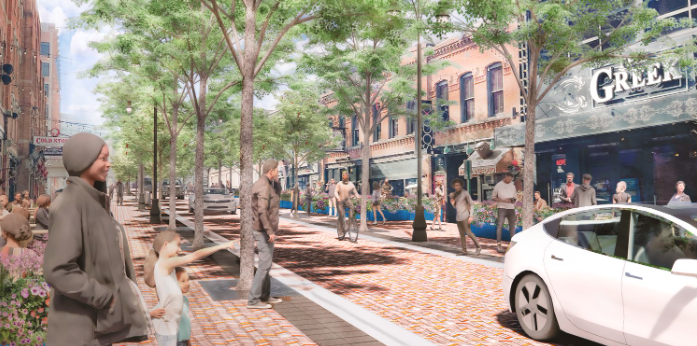
In June, the Greektown Neighborhood Partnership was awarded a $20 million infrastructure grant by the Michigan state legislature to redesign the Monroe Street corridor.
The goals of the redesign are to prioritize pedestrians, drive economic development, calm vehicular traffic, green the area, create space to accommodate outside seating for the restaurants and cafes and connect Greektown to surrounding communities as well as the core of downtown. The project also incorporates several sustainability practices layered throughout.
Melanie Markowicz, executive director of the Greektown Neighborhood Partnership, spoke to SBN Detroit about what this means to the residents, businesses, visitors, and patrons in the area.
Q: How will Greektown use this $20 million grant?
A: The Monroe corridor redevelopment is going to be transformative for Greektown, Detroit, and the whole state. Greektown is one of the oldest neighborhoods in the city. Its roots go back to the 1830s with German immigrants and Greek immigrants settling here throughout history.
Today much of Greektown is owned by multigenerational Greek families. There is this intimate feel with the buildings being so close together and this gorgeous architecture. It’s a special place.
Monroe Street has the highest pedestrian usage in downtown Detroit with prepandemic numbers reaching up to 19,000 pedestrians per day. Pedestrians outnumber the cars. There is a wealth of restaurants and bars and entertainment.
So, with this grant, we have set out to define the future of Monroe Street and pedestrianize it in a formal way.
We will reorient vehicular traffic to one lane in the center of the street and create very wide sidewalks lined with trees and amenities. Currently, there is only one block that can
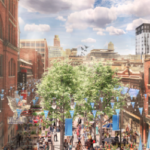
facilitate outdoor cafés and seating, and we want the whole corridor to be able to do so.
The street will ideally become pedestrian-only on weekends and possibly more often than that.
We will create and activate a corridor that truly functions as a beautiful, inviting, connected, and unique public space that incorporates and celebrates its cultural heritage within the design.
Q: How do you think this redevelopment will impact the businesses around it?
A: I think the impact will be significant. Once done, every business that has wanted an outdoor café will have the ability to have one. Before we began planning, we met with every business owner to understand how their business functions so that we can design it to best suit their needs.
When the street is closed to traffic, the center lane will become a pedestrian lane. It will also allow for programming of different kinds. We are building hooks into the ground for tents and designing the space for these activations and festivals.
Pedestrianizing the Monroe Corridor has been a long time coming for this neighborhood and we are thrilled to have the support of the state.
Q: What are some ways you are incorporating sustainability within this development?
A: Sustainability can take a lot of forms from the environment and greening to energy to the materials being used to connectivity within a community.
I think there is a sustainability element to how we approached the project, inviting everyone to the table for the conversation from property owners to businesses to residents to city departments. It’s been fully collaborative to ensure that what we develop here has a long lifecycle.
There are certainly sustainability elements to seeing shifts in climate change. We are working carefully to add mature trees to provide the area with a tree canopy and control the temperature.
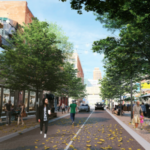
We are intentionally using pavers for the entire corridor versus concrete, so they can be removed for utility work and reinstalled versus concrete or other materials going to a landfill.
We are exploring infrastructure technologies such as ice melting and EV charging stations.
Q: What do you think are the biggest opportunities?
A: We are creating this intimate yet connected space in Detroit that has this authentic flair and feel. There is the greening element and the pedestrian element. Greektown is a tourist destination, so these changes will enhance that experience and allow for even more foot traffic.
Greektown is a core area of downtown yet it has been largely separated. With this project, we aim to connect the urban fabric including the downtown area, Paradise Valley, and more.
Another significant element is that there are all of these other projects in the pipeline around us – and that is intentional. We’ve all been working together. From the Monroe Street corridor to the Randolph Plaza Streetscape project to the restoration of Bedrock properties to the Cadillac Square redevelopment to new public spaces in Paradise Valley – the whole area will change dramatically in the next five years.
Q: What are the economic opportunities?
A: I think there are huge economic opportunities, especially tied in with these other projects. We have this boom of development in the area and underutilized properties. We anticipate vacant spaces being filled and activated. The businesses will be impacted with more patronage and activation of more outside space.
Q: What about the community and cultural impacts?
A: We will incorporate the cultural and architectural heritage in everything we do. Many of the property owners are multigenerational Greek families who have been in the community for decades and created this unique niche and it’s critically important to preserve and highlight that.
We will continue to utilize and preserve Victorian architecture. We are also being intentional about incorporating public art including murals and more.
Q: Is there a job creation aspect involved in this project?
A: Yes. Within the construction and project itself, and also, once we can program the whole space in a new way, that will create jobs along the corridor and within the businesses.
Q: What is your vision overall for the future of Greektown?
A: The beauty of this is that the vision comes from the community itself.
That’s what gets me excited. Incorporating and sustaining Greektown’s heritage and improving on that so that the area just continues to get better and become more connected. Improving the quality of life for residents, business owners, and visitors has a sustainability element to it. We want to make this a community where people feel at home and can thrive for generations to come.
Be sure to subscribe to our newsletter for regular updates on sustainable business practices in and around Detroit.
Kim Kisner
- All
- Business
- Community
- Education
- Events
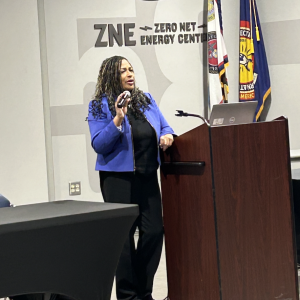
Regina Strong serves as Michigan’s first Environmental Justice Public Advocate, leading the state’s Office of the Environmental Justice Public Advocate. Her role focuses on addressing environmental justice concerns raised by communities, helping residents navigate environmental systems, and working across state agencies to improve equity in environmental decision-making. SBN Detroit interviewed Strong about the challenges communities are facing across Michigan and what environmental justice work looks like in practice....
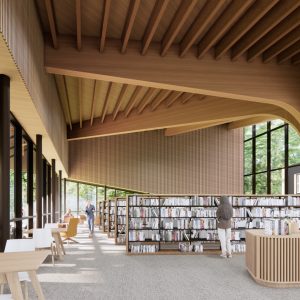
Founded in 1965, Gensler is a global architecture and design firm working across sectors including urban development, commercial real estate, and civic infrastructure. SBN Detroit sat down with Najahyia Chinchilla, senior associate and sustainability consultant, to discuss mass timber, embodied carbon, and what sustainable construction means for Southeast Michigan. Q: Why is wood re-emerging right now as a serious option for large-scale, urban construction? A: Mass timber blends strength, sustainability, and design quality in ways few materials can. Wood has...
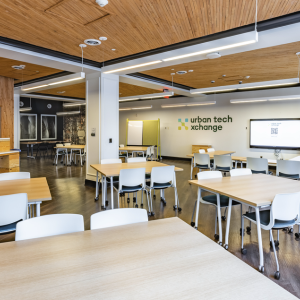
Now in its fourth year of operation, Urban Tech Xchange (UTX) has become a living laboratory where emerging technology startups can test, refine, and validate smart urban systems in real-world conditions. Launched through a collaboration between Bedrock, Bosch, Cisco, and Kode Labs, UTX builds on the foundation of the Detroit Smart Parking Lab (founded earlier by Bedrock, Ford, MEDC, and Bosch) expanding its scope beyond parking into logistics,...



